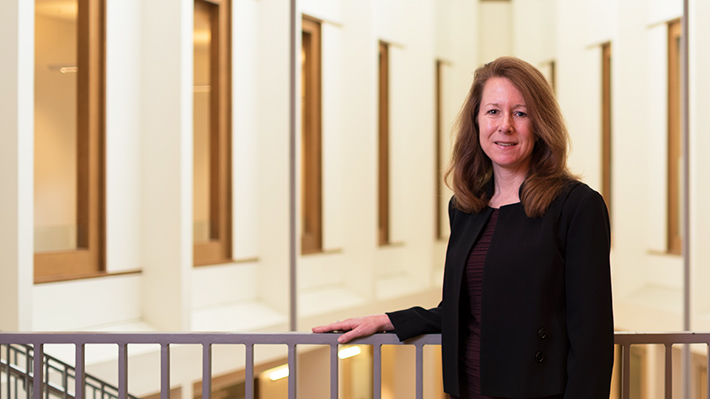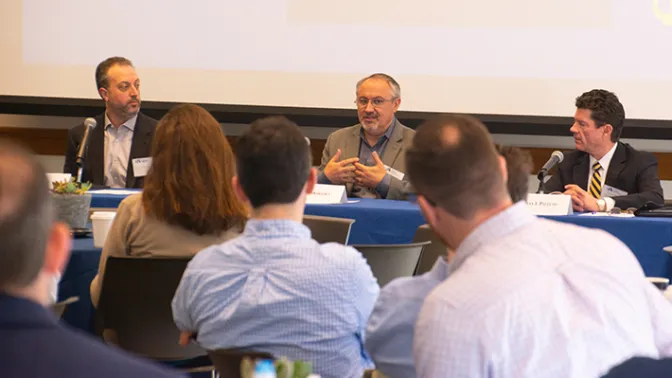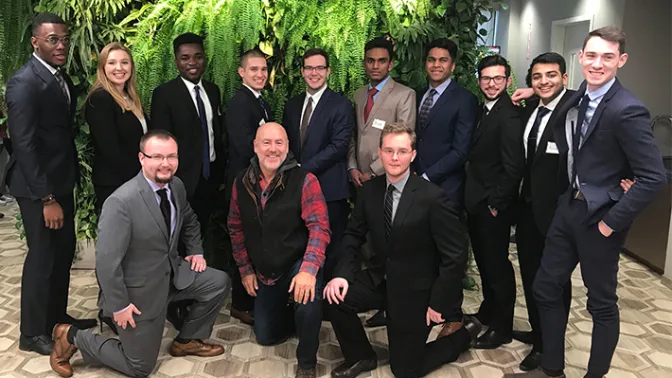
Cryptocurrencies in the Classroom
Cryptocurrency and financial technology, or FinTech, are hot topics in finance: fast-moving and volatile, built on blockchain, but with uncertainty about their value and their future. How do you teach a class that captures all the action in this area?
A course at LeBow on this cutting-edge sector has been years in the planning, and thanks to the efforts of TD Bank Endowed Professor of Finance Michelle Lowry and some guest experts, Cryptocurrency and FinTech (FIN T480) is being taught this quarter and is delivering some valuable insights.
“It’s important for students to have the knowledge of what is going on in this space, but also to have the academic framework so they can understand the bigger picture,” Lowry says. “In order to understand Bitcoin, you need a bit of historical perspective about what money is.”
Early in the spring quarter, Lowry’s students – all juniors or seniors who have taken the essential finance courses – found they knew more about this sector than they realized when Lowry asked what FinTech companies they knew.
“One-third said ‘I don’t know any,’” Lowry recalls. “I said, how many of you have Venmo on your phones? That’s a FinTech company. What about Paypal or LendingClub?”
Lowry began the class by establishing the fundamentals of blockchain and how FinTech is built on that framework with guest instruction from Chris Carroll, Associate Teaching Professor of information science in Drexel’s College of Computing and Informatics. The remainder of the class has laid out different applications and venues in FinTech and their relationship to traditional financial structures.
Lowry sums up the fast-changing nature of the FinTech sector: “Next year, Bitcoin might not be here anymore, but the cryptography and the basic technology will be there.”
For early lessons in Bitcoin and other cryptocurrencies, Lowry enlisted Edwin Handschuh, co-founder and CEO of 1Konto, a broker/dealer startup focused on cryptocurrency exchanges.
Handschuh, a 2010 LeBow finance graduate, became interested in Bitcoin when its price broke $5,000 in fall 2017. As a wealth manager, he says he noticed it because of its price movement and recognized that it was difficult to trade. “It’s a natural fit for a broker-dealer, and we’re building out a prime brokerage for it,” he says.
He compares the transformation brought by Blockchain and related technologies to the shifts wrought by last decade’s global economic crisis. “When I was going through Drexel, the world was changing dramatically. We still had to learn what made now different, even when the professors would say ‘We don’t know what’s going to happen.’”
Ayush Agrawal, a senior majoring in business analytics and finance, is one of a few students in the class who had previously experimented with cryptocurrency, buying Ethereum in 2016. Cryptocurrency and blockchain also came up during his co-op with a hedge-fund software company.
“I thought the course would be a meaningful addition to what I have already learned,” he says. “I liked the fact that we had a professor from [CCI] come in to teach us about how blockchain actually worked. That has been my favorite part of the course so far.”
As part of preparing a business case on Bitcoin, Agrawal and the rest of the class had to look back while speculating about the future: Back in 2015, would you have bought or sold Bitcoin? How about earlier in 2019? And what would you predict Bitcoin’s value to be at the end of this year?
With an eye toward the future as well, Handschuh predicts that blockchain technology is going to underlay everything in the IT sector, calling it “the next iteration of the internet.”
“A lot of top-tier, leading-edge schools are approaching this topic,” he says. “I’m glad to see Drexel is one of them.”

